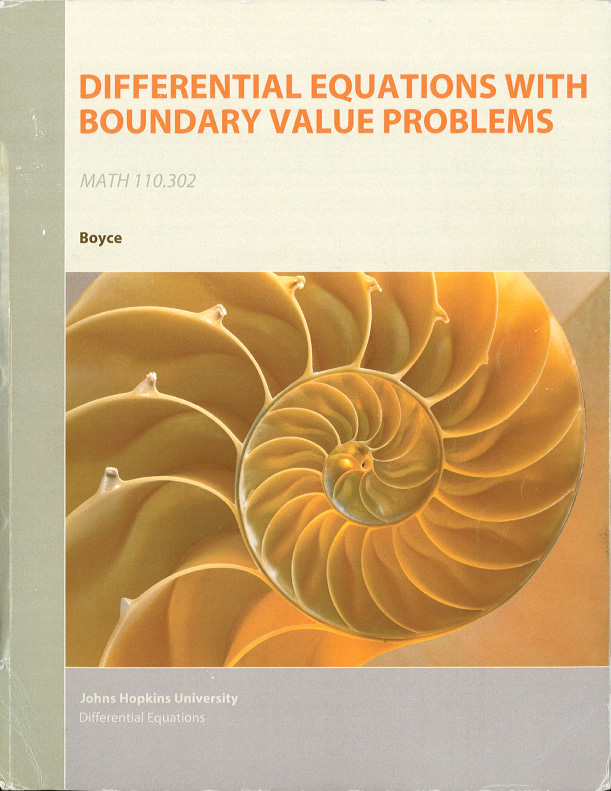Math 110.302 Differential Equations
Fall 2018 Course Syllabus
https://www.rjbrown.me/fall-2018-course-webpage


|
MWF 12:00pm - 12:50pm: Krieger 205 |
|||
|
MWF 1:30pm - 2:20pm: Remsen 1 |
|||
|
403 Krieger Hall |
|
||
|
410-516-8179 |
|
||
|
Office Hours:
|
M |
3:00-4:00 pm |
by appt. other times |
|
Th |
2:00-3:00 pm |
||
Text: Elementary Differential Equations, 10th Edition, Boyce, William E. and DiPrima, Richard C., New Jersey: Wiley, October 10, 2012 ISBN-10: 0470458321 | ISBN-13: 978-0470458327
|
Current Recitation Sections: |
|||||
|
Section |
Time |
Place |
Instructor |
Office Hours |
Office |
|
1 |
Tuesday 1:30pm |
Hodson 203 |
Marino |
T 1:30-2:30 |
Krieger 200 |
|
2 |
Tuesday 3:00pm |
Char Cmns 324 |
Costacurta |
T 4:00-5:00 |
Krieger 207 |
|
3 |
Thursday 3:00pm |
Hodson 301 |
Stubis |
W 3:00-4:30 |
Krieger 201 |
|
4 |
Thursday 4:30pm |
Krieger 309 |
Stubis |
W 3:00-4:30 |
Krieger 201 |
|
5 |
Thursday 3:00pm |
Char Cmns 324 |
X Huang |
W 11:00-12:00 |
Krieger 200 |
|
6 |
Tuesday 3:00pm |
Shaffer 302 |
Gomez |
Th 2:30-3:30 |
Krieger 211 |
|
7 |
Thursday 1:30pm |
Hodson 203 |
X Huang |
W 11:00-12:00 |
Krieger 200 |
|
9 |
Tuesday 4:30pm |
Krieger 309 |
Pichling |
W 5:30-6:30 |
Krieger 207 |
Course Material: The core of the course will center on the text material, and will basically cover the material detailed in the syllabus link below. I may add and/or slightly alter this material depending on how the semester plays out. But the core set of material that I will cover will be what is on the syllabus:
Content Syllabus for 110.302 Differential Equations
In addition to this, you should be aware that the prerequisite for this is a full year of single variable calculus. With an Advanced Placement BC exam score of 5, or the equivalent credits of the course 110.109 Calculus II (Phys Sci & Eng), you are considered prepared for this course. If there is a question, please come see me. For now, what we consider prerequisite content is everything on the syllabus for 110.109. The link is here:
Content Syllabus for 110.109 Calculus II (Phys Sci & Eng)
Grade Policy: There will be weekly homework sets (10%), 3 in-lecture exams (20% each) and a final (30%). The schedule of these exams is given with the homework problems below. There will be no make-ups on homework or exams. If you will not be present when homework is submitted, please submit the assignment early. If you miss a homework or deadline, you can talk to the TA for late acceptance, but I have instructed them to not accept late submissions. If you miss an exam, you will have to be cleared by me to be excused from the exam, a process that will include documentation and a valid excuse. In this case the ultimate grade for that exam will be calculated based on your performance on future exams and the final.
Homework: Homework based on the week’s lectures will be posted as official on the course web site sometime on Friday (Homework may be posted earlier, but may change as the lectures evolve for the week). That assignment will be due in lecture at the end of the following week. See below for the due dates. Homework is an absolutely essential educational part of the course. You will be graded mostly on your ability to work problems on exams. You cannot work problems on exams if you have not practiced the techniques and become comfortable applying the concepts within the homework problems. If you misuse homework by not doing it yourself, or not checking that you can solve a problem on your own after having been shown how to do it, then your exam scores and corresponding grade will reflect this. Trust me on this last point. Talk to your section Teaching Assistant about how to turn in a homework if you cannot go to class. Some additional points:
You are strongly encouraged to collaborate in the analysis and study stage of homework preparation. However, you are required to submit completely original work and must write up your homework for final submission alone.
You will be graded on your PROCESS in homework construction rather than simply your ability to calculate. You must present your homework solutions and not simply answer questions.
Here is a brief idea of how one should construct homework problems for submission:
How to construct homework problem solutions: Example 1: Calculus I Bio , Example 2: Linear Algebra
Also, here is an excellent quick article on good mathematics writing . It is worth the read....
Course Policy: You are responsible for lecture notes, any course material handed out, and attendance in class. While I will not formally record your attendance, I will get to know you and your rate of presence over time. The lectures will be conducted as if you have already read the material and attempted some homework problems. In this manner, you can focus mainly on those parts of the lectures that cover the areas of your reading you found difficult to understand. My teaching style is that of interactive discussion and I will rely on your input in developing the material. Active participation in the classroom is a great way to generate the discussion necessary to fully grasp the material.
Help Room: 213 Kreiger Hall. The hours are 9am to 9pm on Monday through Thursday, and 9am to 5pm on Friday. This free service is a very valuable way to get one-on-one help on the current material of a class from other students outside the course. It is staffed by graduate students and advanced undergraduates.
Ethics Statement:
The strength of the university depends on academic and personal integrity. In this course, you must be honest and truthful. Cheating is wrong. Cheating hurts our community by undermining academic integrity, creating mistrust, and fostering unfair competition. The university will punish cheaters with failure on an assignment, failure in a course, permanent transcript notation, suspension, and/or expulsion. Offenses may be reported to medical, law, or other professional or graduate schools when a cheater applies.
Violations can include cheating on exams, plagiarism, reuse of assignments without permission, improper use of the Internet and electronic devices unauthorized collaboration, alteration of graded assignments, forgery and falsification, lying, facilitating academic dishonesty, and unfair competition. Ignorance of these rules is not an excuse.
In this course, as in many math courses, working in groups to study particular problems and discuss theory is strongly encouraged. Your ability to talk mathematics is of particular importance to your general understanding of mathematics.
You should collaborate with other students in this course on the general construction of homework assignment problems. However, you must write up the solutions to these homework problems individually and separately. If there is any question as to what this statement means, please see the professor or the grader.
For more information, see the guide on "Academic Ethics for Undergraduates" at the JHU Student Affairs web site:
Students with Disabilities: Students with documented disabilities or other special needs that require accommodation must register with the Office of Academic Advising. After that, remind me of your needs at least 5 days prior to each exam; we will need to have received confirmation from Academic Advising.
Midterm Exam I Room assignments: Room assignments for Midterm Exam I are as follows:
Section 1: 12:00 - 12:50pm in Bloomberg 168.
Section 2: 12:00 - 12:50pm in Hackerman 320.
Sections 3 & 4: 12:00 - 12:50pm in Krieger 205.
Sections 5, 6, 7, & 9: 1:30 - 2:20pm in Remsen 1.
Midterm Exam II Room assignments: Room assignments for Midterm Exam II are as follows:
Section 1: 12:00 - 12:50pm in Bloomberg 168.
Section 2: 12:00 - 12:50pm in Hackerman 320.
Sections 3 & 4: 12:00 - 12:50pm in Krieger 205.
Sections 5, 6, 7, & 9: 1:30 - 2:20pm in Remsen 1.
Midterm Exam III Room assignments: Room assignments for Midterm Exam III are as follows:
Section 1: 12:00 - 12:50pm in Bloomberg 168.
Section 2: 12:00 - 12:50pm in Hackerman 320.
Sections 3 & 4: 12:00 - 12:50pm in Krieger 205.
Sections 5, 6, 7, & 9: 1:30 - 2:20pm in Remsen 1.
Final Exam Room assignments: Room assignments for the Final Exam are as follows:
Sections 1,5,9: Krieger 205.
Section 2,3,4,6,7: Mudd 26.
Fall 2018 Tentative Schedule
The details of this material will be updated and reformed as the semester progresses.
Week |
Sections Covered |
Homework (when due) |
Support Material |
|
Course Orientation |
|
||
1.1 Basic Models: Dir. Fields (See 1) 1.2 Solutions to Some ODEs 1.3 Classification of ODEs |
|||
|
2.1 Linear Equations 2.2 Separable Equations |
|||
|
September 14 |
2.3 Modeling w/ 1st Order ODEs 2.4 Linear/Nonlinear 2.5 Autonomous Equations |
||
|
2.5 Bifurcation Diagrams 2.6 Exact ODEs 2.8 Existence and Uniqueness |
|||
|
3.1 Homogeneous Equations 3.2 The Wronskian 3.3 Char. Eqn. Roots: Complex |
|||
|
3.4 Char. Eqn. Roots: Repeated |
|||
| October 3 | Exam 1 (Sections 1.1 through 2.8) | ||
|
3.5 Undetermined Coefficients |
|||
|
3.6 Variation of Parameters 4.1 nth Order Linear ODEs 4.2 Constant Coefficients 4.3 Undetermined Coefficients |
|||
|
7.1 Introduction to Systems 7.2 Review of Matrices 7.3 Linear Algebraic Eqns |
|||
| October 19 | Fall Break: No Classes | ||
|
7.4 First Order Linear Systems 7.5 Homogeneous Linear Systems |
|||
|
7.6 Complex Eigenvalues |
|||
|
7.7 Fundamental Matrices |
|||
| November 7 | Exam 2 (Sections 3.1 through 7.5) | ||
|
7.8 Repeated Eigenvalues 9.1 The Phase Plane |
|||
|
9.2 Autonomous Systems 9.3 Locally Linear Systems 9.7 Periodic Sols & Limit Cycles |
|||
| November 19 -- 25 | Thanksgiving Break: No Classes | ||
|
6.1 Definition of Laplace Transform 6.2 IVP Solutions 6.3 Step Functions |
|||
|
8.1 Euler Method |
|||
| December 5 | Exam 3 (Sections covered from 7.6 to 6.2) | ||
| December 7 |
Course Review |
||
|
|
|
|
|
|
December 12 |
Final Exam |
9:00am - 12:00pm |
|
|
Sections 1,5,9 |
Krieger 205 |
||
|
Sections 2,3,4,6,7 |
Mudd 26 |
||